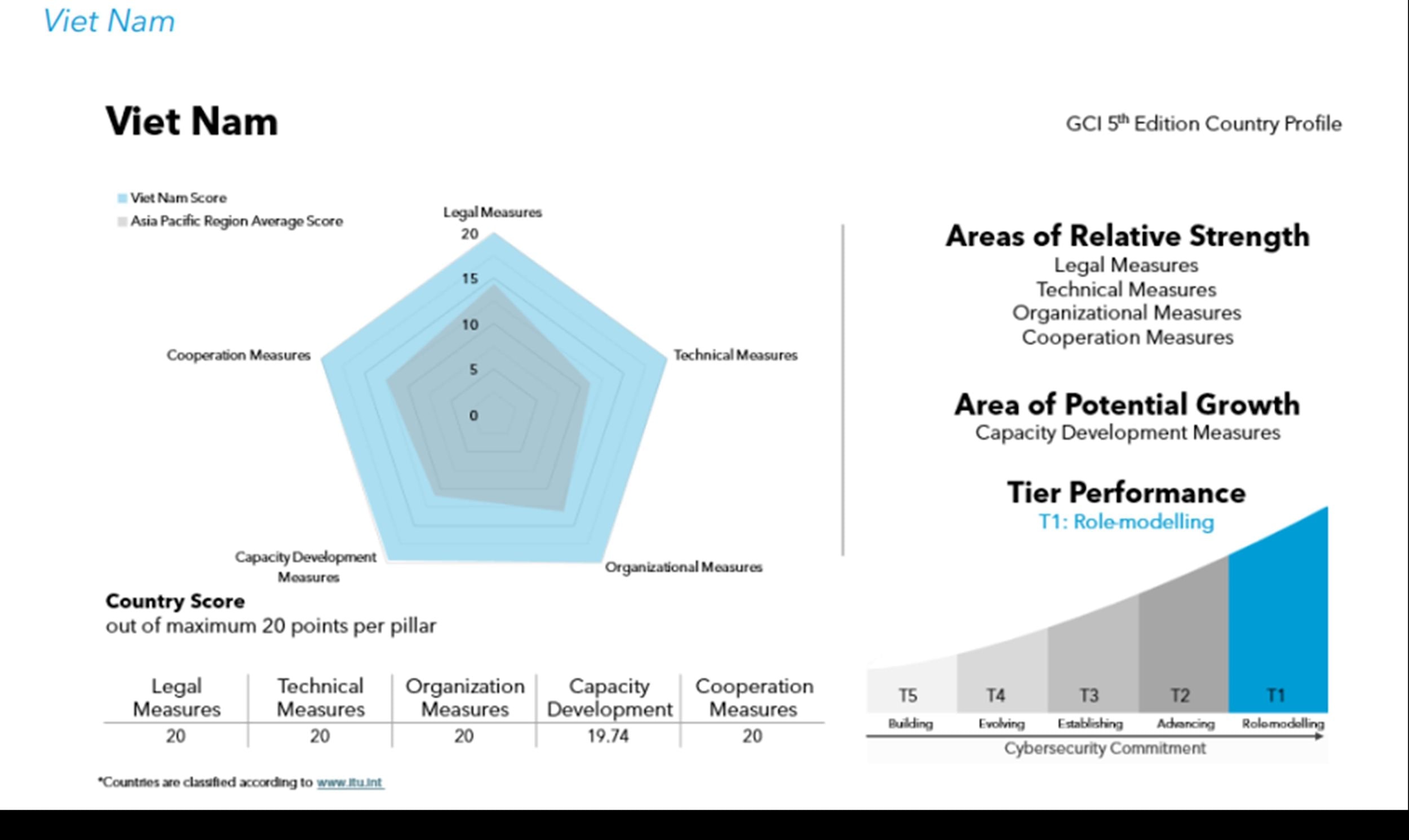Vietnam ranked 16th in the Global Cybersecurity Index 2024
According to the Global Cybersecurity Index 2024 (GCI 2024) report released by the International Telecommunication Union (ITU) on September 12, Vietnam ranked 16th out of 194 countries and territories worldwide.
The Global Cybersecurity Index (GCI) is an initiative of the International Telecommunication Union (ITU), the United Nations specialized agency for information and communications technology. The report was first launched by ITU in 2015 to measure the commitment of 194 ITU member states to cybersecurity, to help them identify areas for improvement and to encourage countries to take action, by raising awareness of the state of cybersecurity worldwide.

The report warned of increasingly serious cyber security threats, including ransomware attacks targeting government agencies and core industries, causing heavy economic losses and crippling production. In addition, personal data breaches are also occurring frequently, threatening the privacy of millions of users.
“Trust is at the core of the digital world. The improvement in the Global Cybersecurity Index is a sign that we must focus all our efforts on ensuring that everyone, everywhere can manage security risks in an increasingly complex digital world,” said Doreen Bogdan-Martin, ITU Secretary-General.
Vietnam jumped 9 places, reaching 16th place out of 194 countries and territories worldwide.
Countries are classified into 5 groups, of which group 1 is the highest group, consisting of 46 countries, playing the role of "model". ITU assessed that group 1 countries have all made significant progress compared to the most recent version of GCI in 2021.

With a score of 99.74 points, Vietnam is one of 46 countries ranked in Group 1 of the ITU Global Information Security Index, with improvements in scores in all five pillars assessed. Vietnam's efforts in building long-term human resource development projects for cybersecurity have been recognized, along with achievements in creating an ecosystem for cybersecurity and safety products.
According to the report, Vietnam has jumped 9 places since the report was published in 2021, rising to 16th place out of 194 countries and territories worldwide, 4th in the Asia-Pacific region and 3rd among countries in the Association of Southeast Asian Nations (ASEAN) in the field of cybersecurity.

In the Asia-Pacific region, Vietnam ranks only behind South Korea (100 points), Indonesia (100 points) and Singapore (99.86 points). Meanwhile, in the ASEAN region, Vietnam ranks only behind Indonesia and Singapore.
The GCI 2024 assesses countries' efforts based on five criteria, reflecting national cybersecurity commitments including: legal, technical, organizational, capacity development and cooperation. ITU also changed the assessment method to better focus on each country's progress in security commitments and its impact.
With 5 evaluation criteria of ITU, there are 4 criteria (legal, technical, organizational and cooperation) Vietnam achieved absolute score of 20/20, except for the capacity development criterion which achieved 19.74/20.
Other key findings from GCI 2024
Legal measures are the strongest pillar of cybersecurity for most countries:177 countries have at least one provision on personal data protection, privacy protection or breach notification in force or in progress.
Computer Incident Response Teams (CIRTs) play a vital role in national cybersecurity:139 countries have active CIRTs, with varying levels of sophistication, up from 109 in the 2021 index.
National Cyber Security Strategies (NCS) are becoming more common:132 countries have a National Cyber Security Strategy by 2024, up from 107 countries in the 2021 index.
Cybersecurity awareness campaigns are widely deployed:152 countries have undertaken cybersecurity awareness initiatives aimed at the entire population, some also targeting specific demographic groups such as vulnerable populations and minorities, to create a cybersecurity culture and address potential risks.
Incentives for the cybersecurity industry continue to grow:Governments are promoting the cybersecurity industry through incentives, subsidies and scholarships, aimed at improving cybersecurity skills and promoting research in the field, with 127 countries reporting some form of cybersecurity-related research and development.
Many countries cooperate on cybersecurity through existing treaties:92% of countries (166) reported being part of an international treaty or equivalent cooperation mechanism to develop cybersecurity capacity or share information or both. Putting cybersecurity agreements and frameworks into practice remains challenging.
Development capacity and technical pillars are relatively weak in most countries:123 countries report having training for cybersecurity professionals, up from 105 countries in the 2021 index. Additionally, 110 countries have a framework to implement nationally or internationally recognized cybersecurity standards, up from 103 countries in the 2021 index.
Capacity development initiatives need to be strengthened:153 countries have integrated cybersecurity into their national curricula at some level, but cybersecurity training and awareness vary greatly across regions. Developing a strong domestic cybersecurity industry is essential to sustaining progress.
Countries need to focus on protecting children online:164 countries have legal measures to protect children online; only 94 countries report relevant strategies and initiatives, suggesting that there is a gap in implementation.
This report aims to better understand countries' commitment to cybersecurity, identify gaps, encourage the incorporation of good practices, and provide useful insights for countries to improve their cybersecurity posture.
